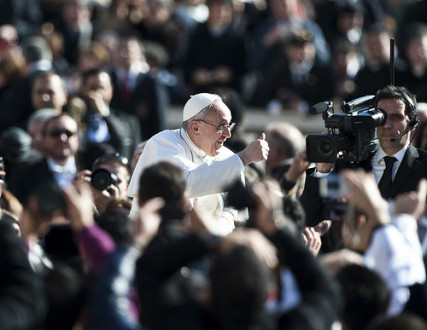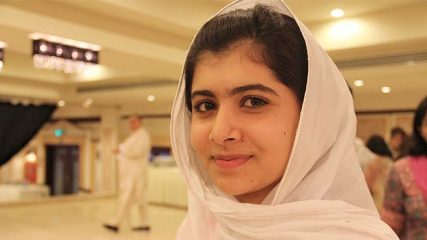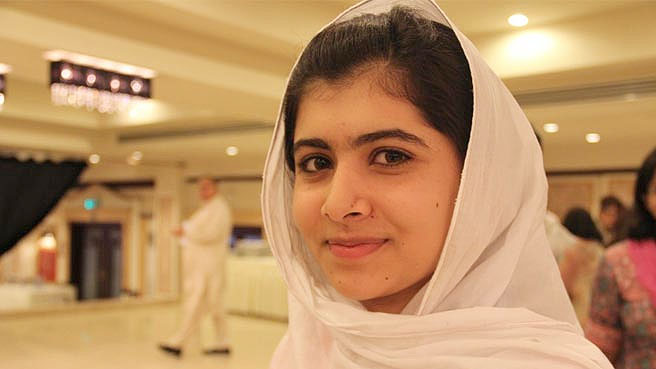“For last year’s words belong to last year’s language
And next year’s words await another voice.
And to make an end is to make a beginning.”
No, TS Eliot did not say these words in 2013. But they’re a good place to start as we think about this most recent trip around the sun and the voices that made it what it was.

Pope Francis at his Inauguration Mass – Photo from the Catholic Church (England and Wales) via Flickr (http://bit.ly/1dps86P)
No voice was as culturally heralded (or commented on) as that of Jorge Mario Bergoglio, Pope Francis. Elected to the office in March 2013, Twitter’s @Pontifex immediately began stunning the general public, Catholic and atheist alike. We’ve come to expect Papal figureheads and doctrinal hardliners, not this gentle man who was rumored to leave the Vatican at night to minister to the homeless (he didn’t actually do this, but the rumors spread so quickly in part because this kind of service is so in line with his character) and refuses to put himself in the position of judge over those who the church have traditionally considered sinners. He has been a breath of fresh air and a figure of powerful humility. Plus which, GQ called him “the chillest pontiff ever to ride in the popemobile” and Esquire named him their best-dressed man of the year (this, while he eschewed the custom-made loafers favored by his predecessors).

Malala Yousafzai in December 2013 – Photo courtesy Diogenes 013 via Wikimedia Commons (http://bit.ly/1eVPS5F)
She was shot by Taliban members in October 2012, but 2013 saw Malala Yousafzai continue her activism on behalf of women in her native Pakistan. At sixteen years old, she was the youngest-ever nominee for the Nobel Peace Prize and her book, I Am Malala, became a bestseller. The book chronicles the story of Malala’s family and her relationship with her father, whose belief in equal access to education was the fuel that energized her activism from a young age. In October, the young Muslim feminist left The Daily Show’s John Stewart speechless when she said she was not interested in revenge against the man who shot her:
“‘You must not treat others with cruelty and that much harshly, you must fight others but through peace and through dialogue and through education’…I will tell him how important education is and that ‘I even want education for your children as well.’ And I will tell him, ‘That’s what I want to tell you, now do what you want.'”
A Gap ad was the unexpected source of controversy earlier this month when a poster featuring actor and designer Waris Ahluwalia, a Sikh man wearing the turban customary to his religion, was defaced. “Make love,” the ad campaign’s slogan, had been changed to read “Make bombs,” and “Please stop driving TAXIS” was scribbled beneath. A senior editor at the Islamic Monthly saw the image on Twitter and shared it with his followers, and Gap quickly responded by asking where the poster was located (a New York subway station). Gap also changed their Twitter banner to the image of Ahluwalia. Arsalan Iftikhar, the Islamic Monthly editor, wrote a piece for The Daily Beast in which he reflected on the clothing company’s handling of this situation and wrote, “as the year 2014 inches closer to us, I want to live in an America where a fashion model can be a handsome, bearded brown dude in a turban.”
http://www.youtube.com/watch?v=AQhMllQ-ODw
July gave us the cringeworthy interview heard ’round the world. Reza Aslan, a historian of religion and author of Zealot: The Life and Times of Jesus of Nazareth, appeared on Fox News for a now-infamous interview with host Lauren Green. “You’re a Muslim,” Green said, “so why did you write a book about the founder of Christianity?” And we’re off! The ensuing couple of minutes are as uncomfortable as any I’ve seen onscreen (and remember, I’ve watched Basic Instinct with my grandmother). Aslan, rightly insulted by Green’s reductionist line of questioning, responds by slowing his speech as one would when talking to a child. “Well, to be clear, I am a scholar of religion with four degrees…who also just happens to be a Muslim.” Green doesn’t want to let it go, so she continues to ask why a Muslim would be interested in Jesus, at which point a frustrated Aslan throws his hands up in the air and starts reading Goodnight, Moon. Kidding. But you get the feeling that’s what he really wished he could do. It was the kind of situation that seemed it could have no winners, except that the resulting publicity drove Zealot even further up the bestseller list, all the way to number one at the New York Times.
There were, of course, plenty of other moments in religion and entertainment. Beyoncé took over the world (or at least the charts) and posted a picture of herself as the foxiest attendee at the last supper. Some stuff happened with Duck Dynasty, then more stuff, and lots of people had lots of reactions. A royal baby was born and christened, carrying on that most British tradition of men wearing dresses. One of Christianity’s best minds died in May.
What will 2014 hold? Hopefully a bit less fighting and a bit more getting along. A shared language rather than a pointed one. A voice that comes in the wilderness to prepare the way. Maybe not. We’ll see.





